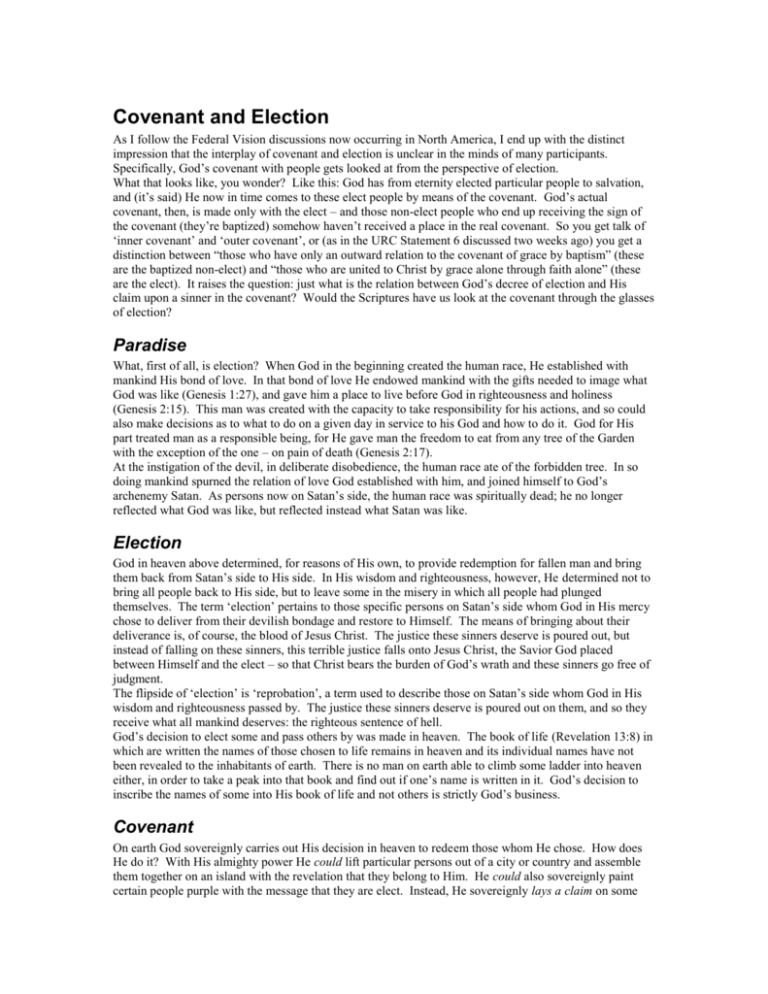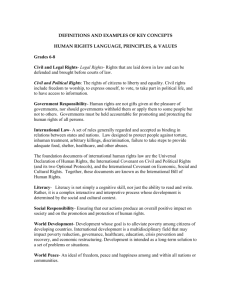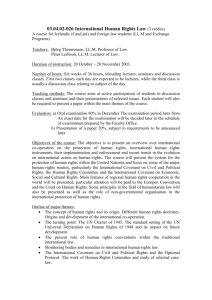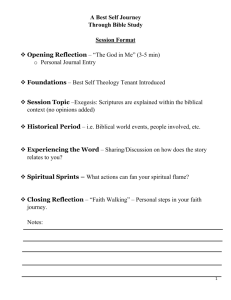Covenant and Election
advertisement

Covenant and Election As I follow the Federal Vision discussions now occurring in North America, I end up with the distinct impression that the interplay of covenant and election is unclear in the minds of many participants. Specifically, God’s covenant with people gets looked at from the perspective of election. What that looks like, you wonder? Like this: God has from eternity elected particular people to salvation, and (it’s said) He now in time comes to these elect people by means of the covenant. God’s actual covenant, then, is made only with the elect – and those non-elect people who end up receiving the sign of the covenant (they’re baptized) somehow haven’t received a place in the real covenant. So you get talk of ‘inner covenant’ and ‘outer covenant’, or (as in the URC Statement 6 discussed two weeks ago) you get a distinction between “those who have only an outward relation to the covenant of grace by baptism” (these are the baptized non-elect) and “those who are united to Christ by grace alone through faith alone” (these are the elect). It raises the question: just what is the relation between God’s decree of election and His claim upon a sinner in the covenant? Would the Scriptures have us look at the covenant through the glasses of election? Paradise What, first of all, is election? When God in the beginning created the human race, He established with mankind His bond of love. In that bond of love He endowed mankind with the gifts needed to image what God was like (Genesis 1:27), and gave him a place to live before God in righteousness and holiness (Genesis 2:15). This man was created with the capacity to take responsibility for his actions, and so could also make decisions as to what to do on a given day in service to his God and how to do it. God for His part treated man as a responsible being, for He gave man the freedom to eat from any tree of the Garden with the exception of the one – on pain of death (Genesis 2:17). At the instigation of the devil, in deliberate disobedience, the human race ate of the forbidden tree. In so doing mankind spurned the relation of love God established with him, and joined himself to God’s archenemy Satan. As persons now on Satan’s side, the human race was spiritually dead; he no longer reflected what God was like, but reflected instead what Satan was like. Election God in heaven above determined, for reasons of His own, to provide redemption for fallen man and bring them back from Satan’s side to His side. In His wisdom and righteousness, however, He determined not to bring all people back to His side, but to leave some in the misery in which all people had plunged themselves. The term ‘election’ pertains to those specific persons on Satan’s side whom God in His mercy chose to deliver from their devilish bondage and restore to Himself. The means of bringing about their deliverance is, of course, the blood of Jesus Christ. The justice these sinners deserve is poured out, but instead of falling on these sinners, this terrible justice falls onto Jesus Christ, the Savior God placed between Himself and the elect – so that Christ bears the burden of God’s wrath and these sinners go free of judgment. The flipside of ‘election’ is ‘reprobation’, a term used to describe those on Satan’s side whom God in His wisdom and righteousness passed by. The justice these sinners deserve is poured out on them, and so they receive what all mankind deserves: the righteous sentence of hell. God’s decision to elect some and pass others by was made in heaven. The book of life (Revelation 13:8) in which are written the names of those chosen to life remains in heaven and its individual names have not been revealed to the inhabitants of earth. There is no man on earth able to climb some ladder into heaven either, in order to take a peak into that book and find out if one’s name is written in it. God’s decision to inscribe the names of some into His book of life and not others is strictly God’s business. Covenant On earth God sovereignly carries out His decision in heaven to redeem those whom He chose. How does He do it? With His almighty power He could lift particular persons out of a city or country and assemble them together on an island with the revelation that they belong to Him. He could also sovereignly paint certain people purple with the message that they are elect. Instead, He sovereignly lays a claim on some people with the promise to be their God (Genesis 17:2). In His good pleasure He establishes this covenant not just with particular individuals, but also with the children He entrusts to the care of those individuals (Genesis 17:7). So, when Abraham’s son Isaac became a father of two boys, Isaac could set his two boys on his two knees and assure them of God’s covenant claim to them both. What, though, was the content of the claim? Did the fact that God established His covenant with both Jacob and Esau mean that the names of both boys were written in God’s heavenly book of life? Does being a covenant child mean that you are also elect? No, the two are not the same, and No, being a covenant child does not mean that one is elected to salvation. That’s obvious from God’s revelation centuries later to Malachi, when God declared, “I have loved Jacob, but Esau I have hated” (1:2,3; Romans 9:13). Esau, then, did not receive eternal life, but remained in bondage to Satan; Esau’s name was not written in God’s heavenly book of life while Jacob’s was. Isaac, though, did not know this information about Esau and Jacob – for God had not revealed it yet. Isaac had to work with the data God had revealed at his point in time, and that was that God established His covenant with believers and their seed (see Genesis 17:7) – and so Isaac could tell both his boys with equal conviction that God claimed them both for Himself. Content If this covenant claim is not a revelation about whether one’s name is written in God’s book of life, what is the covenant really all about?? The content of the covenant is caught in God’s promise to Abraham in Genesis 17:7: God will “be your God”. Recall: by nature Abraham (and Isaac and Jacob and Esau…) are, with all the rest of mankind, on Satan’s side. Yet God told Abraham (and his offspring) that He would “be your God.” This revelation on God’s part was obviously rich for Abraham (and Isaac and Jacob and Esau…). To unpack this wealth so that it’s splendor stares us in the face, we can best turn to the Form for the Baptism of Infants; God, after all, does not change – what He promises us is what He promised Abraham (and Isaac and Jacob and Esau…), and what He promised Abraham, etc, is what He promises us (see also Lord’s Day 27.74). What the promise is? When Jacob and Esau were circumcised, God the Father testified and sealed to them that He established an eternal covenant of grace with them. He adopted both boys to be His children and heirs, and promised to provide them both with all good and avert all evil or turn it to their benefit. When Jacob and Esau were circumcised, God the Son promised them that He would wash them in the blood He would one day shed on Calvary from all their sins, and unite them with Him in His coming death and resurrection. Thus both boys were freed from their sins and accounted righteous before God. When Jacob and Esau were circumcised, God the Holy Spirit assured them both that He would dwell in them and make them living members of Christ. He would impart to them what they already had in Christ, namely, the cleansing from their sins and the daily renewal of their lives, till they would finally be presented without blemish among the assembly of God’s elect in life eternal. This is the glorious gospel father Isaac could impress upon his two sons throughout their childhood and teenage years, and indeed as long as he lived. Isaac knew nothing about whether his sons were both elect, and he knew nothing about an inner covenant and an outer covenant (let alone how his boys might relate to those two), and he knew nothing either about whether his boys might already be regenerated or not. He knew only God’s spoken word to “be your God”. Since that’s what God had revealed, that’s what Isaac (and his sons) had to work with. Responsibility Could Isaac, now, advise his two boys to fold their arms in passiveness and relax in the bliss that God was their Father who would work all things for their good, that their sins were definitely forgiven in the blood of the coming Savior no matter what, and that the Holy Spirit unquestionably would renew them till they were perfected with the rest of God’s elect? Not at all! God in the beginning had created man to be responsible; even in Paradise God did not treat the human race in the same way He treated cedar trees or squirrels. Though man had fallen into sin and so lost his good gifts, the Lord God continued to treat man according to the capacity with which God had created him, ie, responsible. God’s covenant with mankind has two parts, a promise and an obligation. For Jacob and Esau to receive the wonderful goods promised in the covenant, they must answer to the demand of the obligation. The obligation is that they need to believe God’s promises, embrace them in faith. If they refuse to believe, they shall not receive. By way of analogy: the impoverished person who has finally received a cheque can jubilate to those in the room that he’s now rich because he’s received this six-digit cheque. He’s certainly correct in his jubilation; he is rich for his name is on that cheque. But as long as the cheque stays in his house, the wealth implicit in the cheque will not benefit him. He needs to answer to the obligation to bank the cheque. God’s covenant was rich for both Jacob and Esau. Jacob believed the promises of the covenant, and so received its promised goods, and inherited life eternal. Esau did not believe the promises of the covenant, and so received the sentence of God on his disobedience – hell. The response of the two boys to God’s covenant promises was in accordance with God’s eternal decree of election, as it must be for God is sovereign. Yet neither Isaac or Jacob or Esau could work in any way with what was written in God’s book of life simply because they did not have access to that book; they could only work with what God had revealed on earth, namely, His covenant promises and the need to respond. Election and Covenant God has told fallen mankind about the fact that He has chosen particular people to salvation. We are comforted by that revelation, for God’s purposes will come to pass; heaven will not be empty. At the same time we cannot peak into God’s book of life to discover whose names are written there. That’s simply not our business. As Moses said to Israel, “The secret things belong to the LORD our God, but the things revealed belong to us and to our children forever, that we may follow all the words of this law” (Deuteronomy 29:29). God has revealed to fallen mankind how He goes about bringing His elect from Satan’s side back to His side. Part of the process includes the covenant He makes with sinners, a covenant exceedingly rich in promises and at the same time consistent with the responsibility God endowed us with in Paradise. It’s for us to busy our heads with the covenant, and not with election. And when we respond to God’s covenant promises with faith, we conclude with joy that we are elect. We’re sure of our election not because we peaked into God’s book of life, but because God gave us grace to respond responsibly to the covenant – a grace He does not give to the non-elect. C Bouwman









